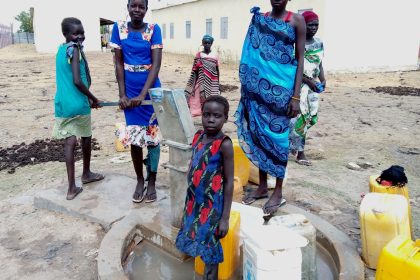CSO’s sound the alarm over ballooning debt, politicisation of social programs
 January 07, 2018 – Despite expansionary budgeting, rapid accumulation of public debt is undermining Uganda’s progress on key social commitments, the public resource watchdog Civil Society Budget Advocacy Group CSBAG says in a new assessment.
January 07, 2018 – Despite expansionary budgeting, rapid accumulation of public debt is undermining Uganda’s progress on key social commitments, the public resource watchdog Civil Society Budget Advocacy Group CSBAG says in a new assessment.
The group also warns of inherent risks in the transfer of key social programs from mandated government institutions, to State House, where they might not easily be open to public scrutiny.
In its newly released analysis of planned allocations under the National Budget Framework Paper for fiscal 2019/20, CSBAG concludes that national debt level remain a major concern despite the positive growth trajectory.
Uganda’s public debt stock was USD 10.7 billion, which was equivalent to 41.5pc of GDP at the end of June 2018. External debt comprised 28.2pc of GDP while domestic debt accounted for13.3pc.
CSBAG notes that while the 2019/20 budget will expand 4.9 over spending in the current financial year, spending on key social sectors such as health, education, social development, agriculture and water and environment, will actually shrink by 12pc. Spending on that cluster will fall from UGX 7.7 trillion in fiscal 2018/19 to 6.8 trillion in 2019/20.
“It is important that Ugandans do not get excite for the thirty-four trillion budget since almost half of the items that comprise it are of no direct benefit,” said Mr. Julius Mukunda the executive director of CSBAG during the launch of the statement January 6.
Overall, government plans to spend UGX 34.3 trillion next financial year compared to UGX32.7 trillion allocated in the current financial year. Correspondingly, debt repayment will take 34pc of the resource envelop while interest payments will escalate to UGX2.9 trillion, or 11.4pc of the total resource envelope.
Furthermore, the government plans to procure $1.6 billion in additional debt. USD885.4 million of this will be non-concessional borrowing compared to$712million in fiscal 2018/19 while the concessional component will drop from $916.6 million procured in the current financial year, to $724.9 million.
CSBAG is also recommending that the government take ownership of the Reproductive, Maternal and Child Health Services Improvement project by financing it from domestic resources because that is more sustainable.
The watchdog also points to asymmetry between government policy intentions and budget allocations. For instance while the government plans to achieve a 3pc increase in school enrollment, it has sharply cut funding to the program to UGX68.9 billion in fiscal 2019.20, from UGX101.5 billion in 2018/19.
CSBAG is also concerned about the duplication of roles of key government agencies by State House which ends starving the core agencies of resources. For instance, while government introduced the Youth Livelihood Program under the Ministry of Gender, Labour and Social Development in 2013, votes for the Youth Livelihood Program and the National Agricultural Advisory Services NAADS, parody votes for the programs have been created under State House for fiscal 2019/20.
As a result the respective vote in the mother ministry will shrink to UGX4.62 billion from 66.66 billion in 2018/19, a reduction of 93pc. Meanwhile the youth program in State House will grow from zero allocation in 2018/19 to UGX130 billion in 2019/20. NAADS allocation has been reduced from UGX 249.99 billion in 2018/19 to 100 billion in 2019/20.
“It is notable that State House does not have the expertise to competently oversee the youth program. It also opens risks of politicization of government programs. Lastly, State House operations are almost beyond public scrutiny and have limited parliamentary oversight,” CSBAG says in its statement.

 African Heads of state head to South Korea next week for Summit talks
African Heads of state head to South Korea next week for Summit talks
 Trading leads as main source of income for Ugandans
Trading leads as main source of income for Ugandans
 New leadership for bankers’ umbrella as total assets top $12 billion
New leadership for bankers’ umbrella as total assets top $12 billion
 Uganda-Tanzania announce date for second joint business forum
Uganda-Tanzania announce date for second joint business forum
 Unpacking results-based financing: balancing strengths with weaknesses
Unpacking results-based financing: balancing strengths with weaknesses
 Big fish in small pond Stanbic notches up $100m profit for 2023 topping previous figure by 15%
Big fish in small pond Stanbic notches up $100m profit for 2023 topping previous figure by 15%
